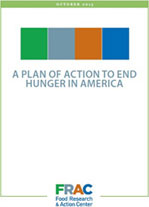Report Underscores Success of Healthy School Meals for All Policies
Five states had Healthy School Meals for All policies in place during the 2022-2023 school year and the Food Research & Action Center’s (FRAC) new report, The State of Healthy School Meals for All: California, Massachusetts, Maine, Nevada and Vermont Lead the Way, highlights the positive impact they had on students and school nutrition departments.
School meals have always played an important role in reducing childhood hunger, supporting good nutrition, and ensuring that students can get the most out of their school day. For more than two school years during the height of the COVID-19 pandemic, schools were able to offer meals to all students at no charge through the pandemic-related child nutrition waivers offered by the U.S. Department of Agriculture (USDA). This served as a trial run for nationwide Healthy School Meals for All, and it was a resounding success.



